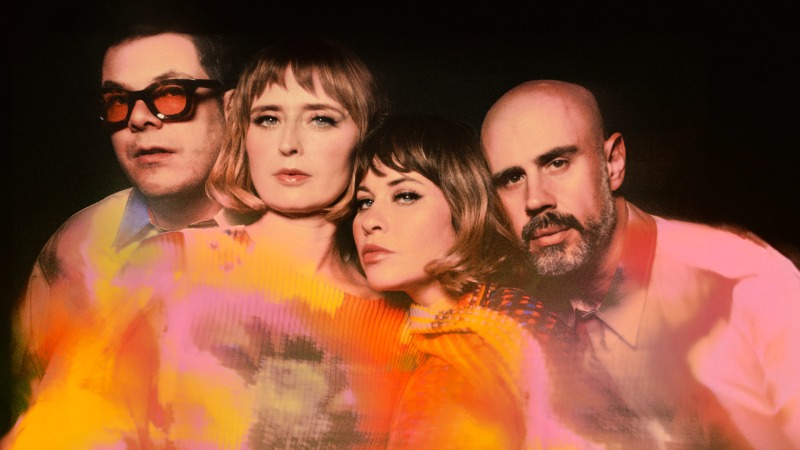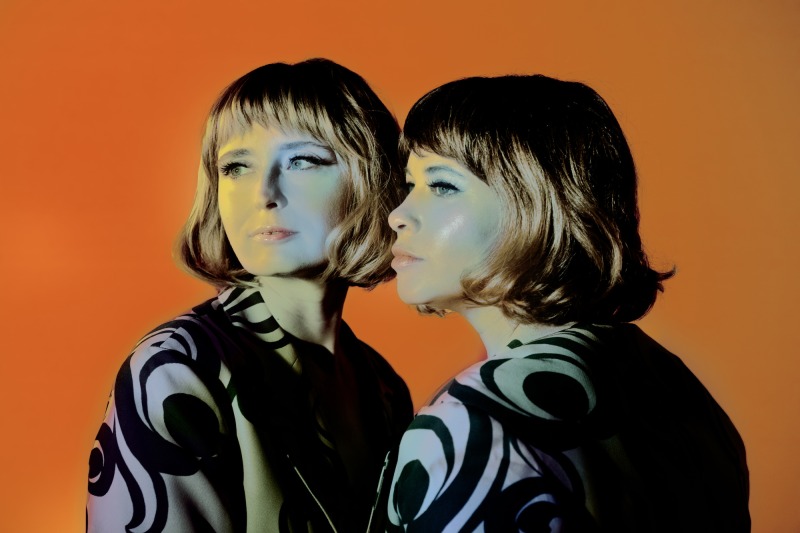How Lucius Came Home
Q&A: Jess Wolfe and Holly Laessig talk with Paste about re-recording their 2014 masterpiece Wildewoman, finding each other again after making Second Nature, working with Adam Granduciel and Madison Cunningham, and their eponymous new album.
Photos by Dana Trippe
Maybe you’ve heard Lucius harmonizing the titular chorus in Harry Styles’ “Treat People With Kindness,” or tweaking their singing into celestial patches in the War on Drugs’ “I Don’t Live Here Anymore.” Or, perhaps, you saw them in Roger Waters’ band on his Us + Them Tour in the late 2010s, where they both took the lead on Clare Torry’s wordless “The Great Gig in the Sky.” I promise you, Lucius is a part of you somehow. They’ve sung with the likes of My Morning Jacket, Jackson Browne, the Killers, Sheryl Crow, and Mavis Staples. They performed a Tiny Desk Concert before the series got really massive. Their pastoral-rock furrows in cavalier, capable, and countrified tempos, tones, and ‘tudes.
And last year, Jess Wolfe (who was deep into her pregnancy at the time) and Holly Laessig joined Joni Mitchell’s backing band for her Hollywood Bowl shows. I tell them I was at the second night’s show. “It was really quite transcendent,” Wolfe says. The duo were a part of the original ensemble that accompanied Mitchell during her Grammy-winning comeback performance at Newport Folk Festival in 2022. They, along with Brandi Carlile, the Hanseroth twins, Blake Mills, Dawes’ Taylor Goldsmith, Marcus Mumford, Allison Russell, and Matt Chamberlain, started the whole thing, decamping to Mitchell’s house in California and performing the “rehabilitating jam sessions” that became the “Joni Jam” performance at the Bowl in October 2024.
But Lucius, the titanic pop group found in the smartest corners of the indie and mainstream world, have never sounded like this before. Three years ago, on Second Nature, they dawdled in sun-dappled ‘80s pop and filtered lockdown fears and restlessness into big dance bops. Then, they returned to the studio to redo their breakthrough, sort-of-debut album Wildewoman, which led them to a record titled after themselves. With their longtime bandmates Dan Molad and Peter Lalish—Wolfe and Laessig are back at their finest now, evoking roads they’ve crossed and named often since forming in Ditmas Park, Brooklyn in 2007: girl-group revivalism, cosmic pop, and a kind of bicoastal harmonizing that once echoed through western canyons.
Wolfe and Laessig are vocal foils for other singers but plug so perfectly into one another. “Gold Rush” fantasizes through a groove replete with funk beats and dauntless, sensual caroling; “Strange Love” is a piano ballad warped into a cowboy croon, the duo’s voices wrapped around walloping synths and bright, fretty guitar; “Impressions” is a collision of schools both old and new, with a pop-country charm and effervescent nod of electronica—the plinking synth-and-bass melody behind Lucius’ vocalists sounds big enough to fill a stadium. They’ve called Lucius their “coming home” record. And in the versatility of these new songs, be it the psychedelic glissando of “Stranger Danger” or the muscular guitars measuring the melody heroics of “Old Tape,” and the presence of contributors like Rob Moose, Luke Temple, Madison Cunningham, and the War on Drugs’ Adam Granduciel, it’s clear that their homecoming is a party you’ll want to RSVP to.
Earlier this spring, I had a chance to sit down with Wolfe and Laessig to discuss their re-recording of Wildewoman, how they found themselves again after making Second Nature post-quarantine, working with Granduciel and Cunningham, and their new eponymous album. This interview has been edited for clarity.
*****
Paste Magazine: You re-recorded Wildewoman for its 10-year anniversary last year. How affirming was it, getting to not just revisit those tracks but getting to perform them from where the two of you are at now in your career?
Jess Wolfe: It’s like living in something for a long time. The revisiting of that record brought us to this most recent album. It’s like wearing shoes for such a long time with the same people—for the most part—you’ve evolved, hopefully, as a person. The way that you sing, what you’re singing about, even if the song was written with a certain sentiment, it changes for you—and hopefully for the listener—while keeping a strong element of nostalgia there. The revisiting of that album and how we made it and how we did it ourselves and where it was coming from, it really did inspire [Lucius].
Some of those songs, you’ve been singing them every night for a decade. How does the meaning shift when you take them back into a studio, as opposed to performing them on stage? Do you notice yourself growing up alongside those songs in the moment, or does it take a concentrated effort like the re-recording to let you step back and look at not just who Lucius was in 2014, but what Wildewoman is now in 2024?
JW: As we’re going, you get tired of a certain sentiment, or there’s a certain song that doesn’t feel authentic—depending on where you are at a certain moment in time, or what city you’re in, or how you’re feeling that day. But getting into the studio, you really are picking apart a song and how it was originally recorded. You forgot certain elements that were there that had naturally evolved during a live show. We wanted to both honor what the music had become and who we had become as people and, also, the way it was recorded to begin with. We did a little bit of both—both things are true.
Holly Laessig: I remember, when we started going back into the studio, listening to the record again and being like, “Wow, I really haven’t listened to this in so long. It sounds different than I remember. It sounds awesome.” Even when we were picking apart the songs, you come across things and you’re thinking, “I have not been singing that harmony for the last, like, seven years. That’s what it’s supposed to be? Okay, I’ve been singing something totally different.” For some of the recordings we did, we did try to go back and learn what we originally did. There were a couple instances where I was like, “Well, I want to do this too, because this is what has popped up over the years, doing it live.”
I interviewed Ann and Nancy Wilson last year and we were talking about songs like “Crazy On You” turning 50, and Ann had said that she didn’t know how to relate to that song 50 years later—because she’s not going through what she was going through when she wrote it. And Nancy told her, “Yeah, but somebody could relate to that song.” And that recharged her before their tour. I feel that way about a lot of Wildewoman. I was getting a lot of it five, six years ago, and then I started looking at other parts of the record and thinking, “Okay, I’m getting this now.” It’s really holding up in different ways.
-

-

-

-

-

-

-

-

-

-

-

-

-

-

-

-

-

-

-

-

-

-

-

-

-

-

-

-

-

-

-

-

-

-

-

-

-

-

-

-









































